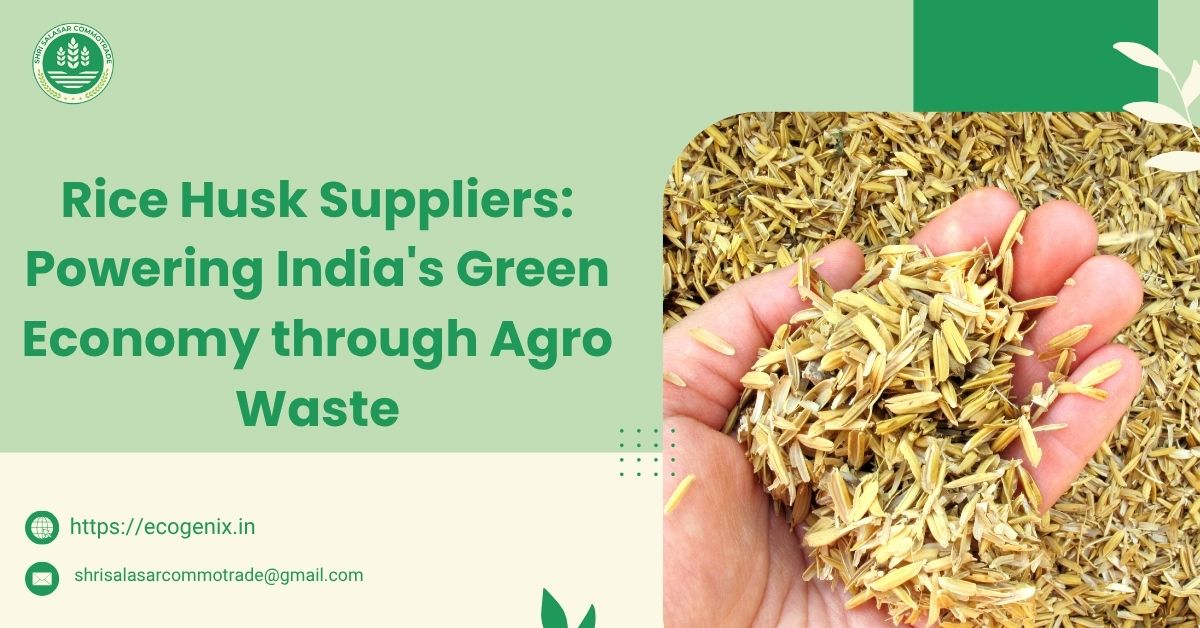Rice Husk Suppliers: Powering India’s Green Economy through Agro Waste
Introduction India, as one of the largest producers of rice, generates an enormous amount of agricultural by-products. Among these, rice...

Introduction
India, as one of the largest producers of rice, generates an enormous amount of agricultural by-products. Among these, rice husk (the hard protective covering of grains of rice) has emerged as more than just waste, it’s now recognized as a valuable resource. With rising interest in sustainable materials and bioenergy, rice husk suppliers are becoming vital players in India’s green economy.
What is Rice Husk?
Rice husk, also known as rice hull, is the outer shell removed from rice grains during the milling process. It accounts for nearly 20% of the paddy weight and has traditionally been discarded or burned.
But with evolving technology and sustainable thinking, rice husk is now in demand for:
- Fuel (biomass energy)
- Construction material
- Fertilizer
- Industrial filler
- Packaging material
India’s Rice Husk Landscape
India produces around 200 million tonnes of paddy annually, generating approximately 40 million tonnes of rice husk. States like West Bengal, Punjab, Uttar Pradesh, Andhra Pradesh, and Tamil Nadu are the key hubs for rice cultivation and, hence, for husk supply.
Rice husk suppliers play a critical role in collecting, processing, and distributing this agricultural residue to industries that need eco-friendly alternatives to wood, coal, or plastic.
Who Are Rice Husk Suppliers?
Rice husk suppliers are businesses or individuals who:
- Collect husk from rice mills
- Process it (drying, compressing, pelletizing, or grinding)
- Distribute it to industries in India and overseas
They may operate in:
- Loose husk supply
- Husk briquettes or pellets
- Silica-rich rice husk ash (RHA) for cement and steel industries
Industries That Depend on Rice Husk Suppliers
Let’s explore some of the key sectors that rely on rice husk:
Biomass Energy Plants
Rice husk is used as fuel to generate renewable electricity and heat. It’s carbon-neutral and cost-effective.
Example: Husk Power Systems, operating in Bihar, powers villages using rice husk gasification.
Cement and Construction
Rice husk ash is a source of amorphous silica, which is used as a pozzolanic material in cement manufacturing, reducing the carbon footprint of construction.
Steel Industry
The high silica content in husk ash acts as a deoxidizing agent in steel manufacturing, making it a sustainable replacement for mineral additives.
Fertilizer and Soil Enhancers
Processed husk is used in making organic fertilizers, compost, and mulch as it improves soil aeration and retains moisture.
Animal Feed and Bedding
Rice husk is used in poultry farms and dairies as bedding material. It’s absorbent, cost-effective, and biodegradable.
Packaging and Board Industry
Rice husk is used as a raw material in making biodegradable trays, cartons, and boards, replacing plastic and wood-based packaging.
The Business Model of a Rice Husk Supplier
A rice husk supplier typically operates in the following stages:
Sourcing
- Collects husk from multiple rice mills.
- Partners with mill owners or buys in bulk at low rates.
Storage and Drying
- Husk is stored in covered units and dried to reduce moisture content (important for fuel quality).
Processing
- Grinding into powder for ash or boards
- Pelletizing or compressing into briquettes for fuel
- Burning under controlled conditions to produce RHA
Logistics
- Uses trucks or containers to transport rice husk to clients
- Must maintain moisture-free conditions to retain quality
Sales and Distribution
- Sells to biomass plants, cement companies, manufacturers, and exporters
- Some also supply to international markets (e.g., the Middle East, Africa)
Why the Demand for Rice Husk is Growing
Eco-Friendly Fuel Alternative
- Replaces fossil fuels like coal in power plants and kilns
- Has low ash content, low emissions
Supports Zero Waste Economy
- Makes use of agricultural waste that was earlier discarded or burned
Cheaper Raw Material
- Compared to wood or synthetic materials, rice husk is low-cost
Government Push
- Schemes like PM-KUSUM and National Bio-Energy Mission promote biomass usage
Digital Shift: Rice Husk Business Goes Online
Modern rice husk suppliers are now using digital tools for growth:
- WhatsApp & Telegram Groups to connect with buyers
- Google My Business listings to get local leads
- E-commerce platforms like IndiaMART and TradeIndia to sell husk, briquettes, and ash
- Online invoicing and payment systems for smoother operations
Tips for New Rice Husk Suppliers
Here’s how to succeed in this business:
Build Partnerships with Rice Mills: Secure long-term supply contracts.
Invest in Drying and Storage Units: Maintain husk quality to attract premium buyers.
Focus on Niche Markets: Explore silica-based ash sales to cement or steel units.
Maintain Compliance: Ensure licenses for transport, pollution control, and warehousing.
Use Online Marketing: Join trade portals, post videos of your processing setup, and get buyer reviews.
Note:- Purchase affordable rice husk ash in India
Conclusion
Rice husk, once discarded as farm waste, is now the fuel of the future, the filler for industries, and the secret behind cleaner construction. Suppliers who understand its value are not just running a business they’re supporting India’s transition to a low-carbon, circular economy.
With government support, industry demand, and rising environmental awareness, the rice husk supply chain is poised for exponential growth. If you’re looking to step into a sustainable business model that’s both profitable and planet-friendly, becoming a rice husk supplier might be your golden opportunity.





